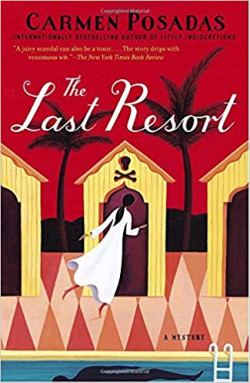In a strange case of synchronicity, the two books I read for #spanishlitmonth – purely because I thought it time for a little completist reading – have quite a lot in common. Firstly, both are by female authors, secondly they are satiric murder mysteries, and thirdly both feature meditation centres and spas, of the kind to provide rest, relaxation and recovery from the stresses of 21st century living. Allegedly.
———
 Teresa Solana’s The Sound of One Hand Killing, translated from Catalan by Peter Bush, is her third Barcelona murder mystery featuring twin brothers, Borja and Eduard Masdeu. Business is not booming, and so they accept a commission from a certain author – none other than Teresa Solana herself – to research the world of alternative therapies. No sooner have they enrolled at one of the most exclusive Barcelona institutions, than the director is found dead, his skull crushed by the statue of a Buddha. That someone had a grudge against him became all too apparent during the Masdeu’s meditation weekend. There were too many mishaps for it to be coincidental.
Teresa Solana’s The Sound of One Hand Killing, translated from Catalan by Peter Bush, is her third Barcelona murder mystery featuring twin brothers, Borja and Eduard Masdeu. Business is not booming, and so they accept a commission from a certain author – none other than Teresa Solana herself – to research the world of alternative therapies. No sooner have they enrolled at one of the most exclusive Barcelona institutions, than the director is found dead, his skull crushed by the statue of a Buddha. That someone had a grudge against him became all too apparent during the Masdeu’s meditation weekend. There were too many mishaps for it to be coincidental.
The director’s is not the only violent death to disturb the Masdeu’s equanimity. They discover the assassinated corpse of their CIA agent neighbour, but, decide not to report it to the police, choosing instead to cover their tracks. Now why would they do such a thing? They have their reasons – and I leave them for you to discover – but the decision doesn’t half complicate their existence, particularly in view of Borja’s involvement in a conspiracy to smuggle a priceless Assyrian figurine. (Anything to make a bit of money.)
This mix of international smuggling gangs and spy rings lends itself to some delicious cases of mistaken identities, with the supposedly sophisticated Borja digging himself and his brother, the ever loyal Eduard, deeper and deeper into the mire. Yet amidst the farce, there is a real bite, with Solana skewering the pretensions of unscrupulous alternative health practitioners and their cyncial preying on the insecurities of their clientele.
———
 Solana’s farce is replaced by a dry – at times, venomous – wit in Carmen Posadas’s The Last Resort, translated from Spanish by Kristina Cordero. L’Hirondelle D’Or is an exclusive resort in Morocco, a high society retreat from the pressures imposed by the papparazzi and scandal. And the widow Valdés is currently fleeing a rather juicy scandal surrounding the recent death of her lothario husband ….
Solana’s farce is replaced by a dry – at times, venomous – wit in Carmen Posadas’s The Last Resort, translated from Spanish by Kristina Cordero. L’Hirondelle D’Or is an exclusive resort in Morocco, a high society retreat from the pressures imposed by the papparazzi and scandal. And the widow Valdés is currently fleeing a rather juicy scandal surrounding the recent death of her lothario husband ….
Her stay coincides with that Rafael Molinet Rojas, although it is obvious that L’Hirondelle d’Or is not his natural milieu. In fact, following the death of his mother, Molinet chooses it as the place of his final hurrah. He plans to indulge himself for a totally unaffordable fortnight of luxury before swallowing his stash of pills. Yet there is something about the widow Valdés that ignites his curiosity and elicits his sympathy.
Just before travelling to the resort, he had enjoyed a rather gossipy lunch with his niece – and when I say gossipy, I mean pages and pages of unfounded insinuation and rumour about widow Valdés – the stuff of the tabloids. His niece it seems is incapable of condensing the story to its essence. It drives Molinet mad; it drove me mad during the first chapter. But the irony is, with Molinet’s narrative, Posadas preserves the tone she is pillorying throughout the novel.
Anyway, a chord has been struck. When, by pure coincidence, other members of European high society appear at the resort, and the peace of the widow Valdés is threatened, Molinet finds himself springing to her defence, Not in an overt way. The impoverished man could not consort openly with this set. He becomes a snoop, and takes action when needed to prevent a particularly unscrupulous journalist from damaging the widow any further.
Was the widow complicit in the death of her husband? What is the secret from Molinet’s past that binds him so compulsively to her? These are the two mysteries that are threaded through Posadas’s sassy narrative. There are multiple viewpoints in which the characters reveal shade and nuance that would never be otherwise discernible, Narrators include the formidable Miss Guêpe (director of L’Hirondelle D’Or), Sanchéz (the journalist), the widow Valdés and Molinet himself. I particularly enjoyed the epigraphs at the beginning of each chapter, matters of etiquette and other behavioural indicators, some of which are more revealing than others. Such as this which can be said to summarise events at the last resort!
When six rats are placed together in a box, sooner or later they will begin to eat one another. This is a scientifically proven fact.
———
And so my TBR is now devoid of two favourite authors. Fortunately there is a new Solana due in August. But no new translations of Posadas on the horizon. This puzzles me. There’s been nothing since Child’s Play in 2008, and yet in the intervening decade her novels have won multiple awards. Can it really be true that there is no anglophone audience for a writer described as the perfect blend of Agatha Christie and Almodóvar?